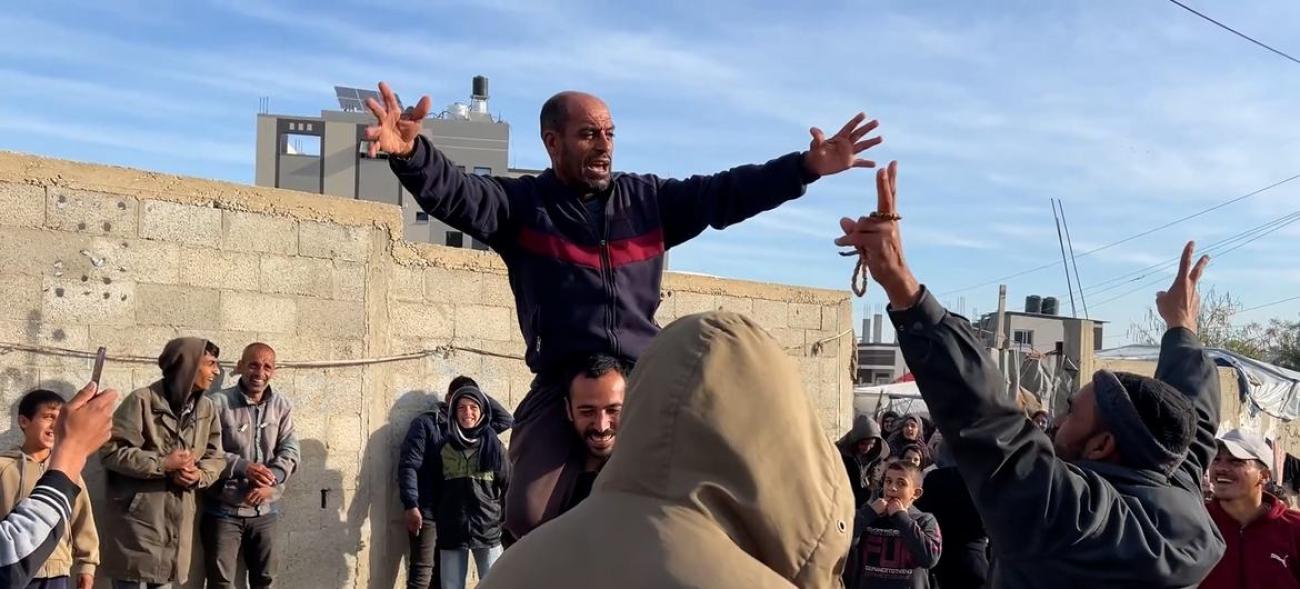Guterres welcomes start of ceasefire in Gaza as UN ramps up food deliveries

UN humanitarian convoys brought in urgently needed food aid to begin pulling the war-ravaged territory back from starvation.
Secretary-General António Guterres welcomed the start on Sunday of the ceasefire and hostage release in Gaza, as UN humanitarian convoys brought in urgently needed food aid to begin pulling the war-ravaged territory back from starvation.
“We stand ready to support this implementation and scale up the delivery of sustained humanitarian relief to the countless Palestinians who continue to suffer,” the UN chief said in a social media post.
He added: “It is imperative that this ceasefire removes the significant security and political obstacles to delivering aid.”
According to news reports, three Israeli hostages held by Hamas were released and transferred by the Red Cross back to Israel, as the first phase of the ceasefire deal took effect. Reports suggest that later on Sunday, Israel is expected to release some 90 Palestinian prisoners.
Brokered last week by the Qatar, Egypt and the United States, the three-phase ceasefire comes 15 months after Hamas militants attacked Israel on 7 October 2023. Some 1,200 people were killed and 250 were taken as hostages, with around 100 still being held.
Israel launched the military campaign following the Hamas-led attacks on its territory.
More than 46,000 Palestinians have been killed since the conflict began, according to Gaza’s health authorities,
The Gaza strip has since been devastated and its two million inhabitants left in dire need of food and other necessities.
The ceasefire and the implementation of the first phase was hailed by the United Nations as a crucial step toward peace and toward alleviating the immense suffering endured by the Palestinian population.
In a separate statement, UN Emergency Relief Coordinator Tom Fletcher highlighted the entry of humanitarian aid into Gaza following the ceasefire.
“As the ceasefire entered into force today, humanitarian aid moved into Gaza as part of a prepared surge to increase our support to survivors. More than 630 trucks with humanitarian aid entered Gaza today, with at least 300 of them going to the north.”
He acknowledged the challenges faced in delivering aid, stressing the importance of safety for civilians and aid workers.
Mr. Fletcher, who heads up the UN Office for the Coordination of Humanitarian Affairs (OCHA) expressed gratitude towards UN teams and partners, emphasizing their courage and creativity in preparing for this moment.
“I urgently call on countries with influence over the parties to ensure that this lifesaving aid reaches those who need it most,” he said.
What’s left of ‘home’
In the early morning hours after the ceasefire went into effect, many displaced Palestinians began gradually returning to see what is left of their homes.
Shadi Jumaa Abu Sheha returned to Nuseirat in central Gaza, only to find the dwelling he had built mostly with his own hands “is no longer a home, it is a ruin.”
He was accompanied by a UN News correspondent in Gaza as he assessed the extent of the damage, which had left some of the rooms in ruins, their interiors now open to the weather.
Still, Shadi was relieved that “the bloodshed has stopped”, telling our correspondent: “This is an indescribable feeling. Thank God we survived this war unharmed. But I cannot describe the extent of the destruction...I do not know what to say.”
Safe humanitarian access needed
For its part, the UN World Food Programme (WFP) acted swiftly, with convoys entering Gaza early on Sunday from Egypt and via Ashdod, Israel.
The ceasefire has allowed the agency to bring in urgently needed food supplies at an unprecedented scale, aiming to stave off starvation in the war-torn region, the agency said in a press release.
WFP Executive Director Cindy McCain emphasized the critical nature of this initiative, noting that the agency’s goal is to deliver at least 150 truckloads of food into Gaza daily.
“After 15 months of war, we need all border crossings to stay open and function efficiently, effectively and reliably. And we need humanitarian teams to be able to move freely and safely across Gaza to reach those in need.”
Health challenges ahead
Meanwhile, the World Health Organization (WHO) expressed its support for the ceasefire and highlighted the monumental health challenges that lie ahead.
The conflict has left a devastating toll: more than 46,600 people killed, over 110,000 injured, and a health system in disarray, the agency said in a press release.
WHO underscored the urgent need for billions in investment to restore the health infrastructure, calling for the unwavering commitment of donors and the international community.
The UN health agency and its partners plan to implement a 60-day plan focusing on trauma and emergency care, primary health care, child health, and other critical areas.
“WHO calls on all parties to uphold their commitment to fully implement the ceasefire agreement and to continue working towards a political solution to address the protracted crisis in the occupied Palestinian territory, which is essential for lasting peace.” the agency said.
Focus on women and girls
UN Women has also welcomed the ceasefire and hostage release agreement, expressing hope that all parties will honor their commitments to pave the way for lasting peace for women and girls in Palestine, Israel, and the region.
“The news of the ceasefire brings relief for the 1 million women and girls who have lived under continued bombardment, without safety in Gaza for the last 470 days,” the agency said in a statement.
The agency highlighted the urgent need for humanitarian relief and reaffirmed its commitment to working alongside women's organizations and the families of Gaza to advocate for inclusive recovery efforts, rights, safety, and dignity.
While these efforts mark a significant step forward, the road to recovery is fraught with challenges, UN Women said, urging all parties to uphold the ceasefire and facilitate the safe and efficient delivery of aid.

